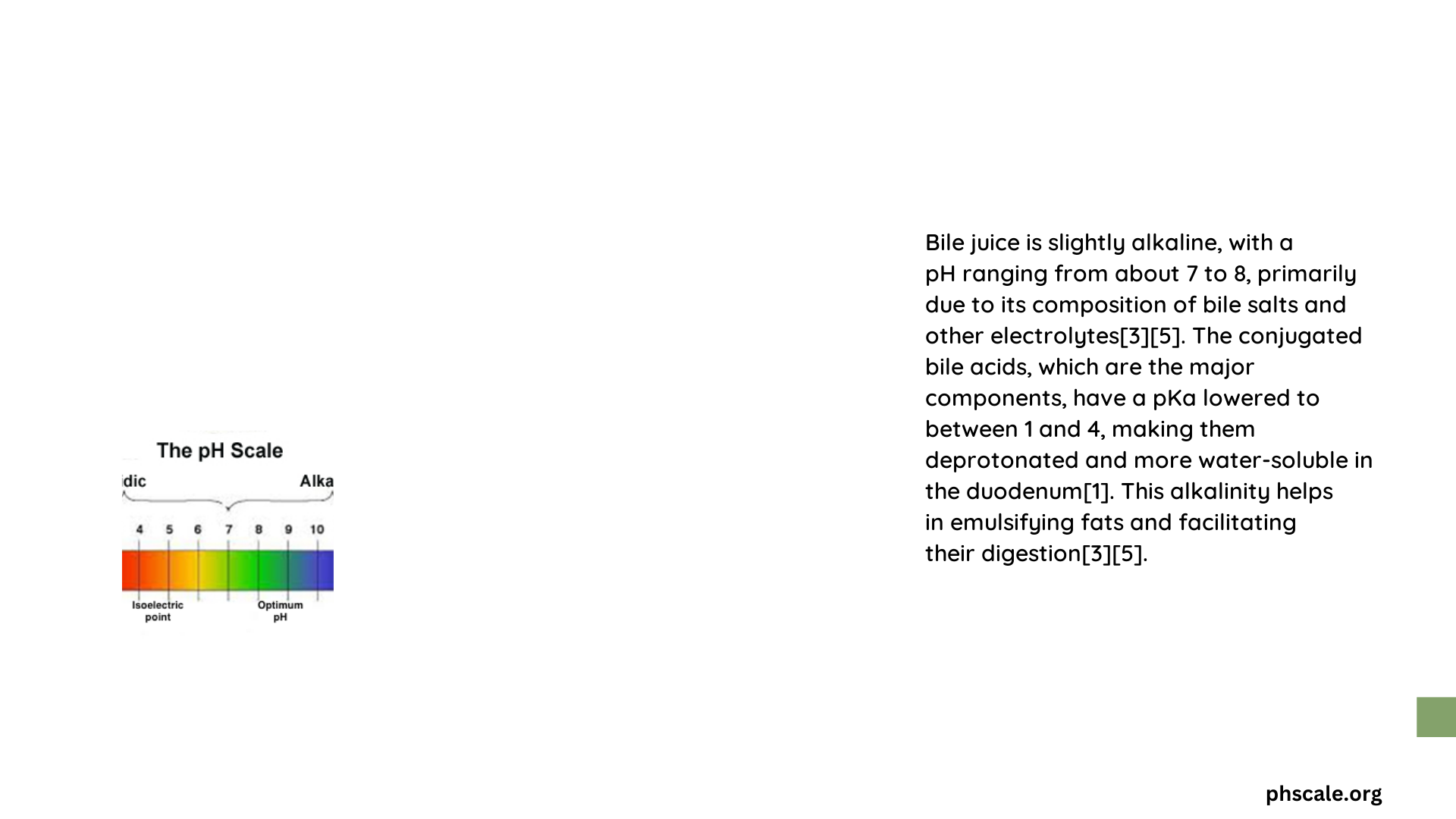Bile juice, a crucial component of the digestive system, is often misunderstood in terms of its acidity or alkalinity. Despite its name containing the word ‘acid’, bile juice is actually basic (alkaline) in nature. With a pH range typically between 7.6 and 8.6, bile juice plays a vital role in digestion, particularly in the emulsification of fats and the activation of certain digestive enzymes. This article delves into the composition, function, and pH characteristics of bile juice, addressing the common misconception about its acidity.
What Is the pH Level of Bile Juice?
Bile juice has a pH range of 7.6 to 8.6, placing it firmly in the alkaline category on the pH scale. This alkaline nature is crucial for its digestive functions and distinguishes it from other digestive fluids like stomach acid.
| Digestive Fluid | pH Range |
|---|---|
| Stomach Acid | 1.5 – 3.5 |
| Bile Juice | 7.6 – 8.6 |
| Pancreatic Juice | 8.0 – 8.3 |
Why Is Bile Juice Called ‘Juice’ If It Contains Acids?

The term ‘bile juice’ can be misleading, as it contains bile acids but is overall alkaline. Here’s why:
- Composition: Bile juice is a complex mixture containing bile acids, bilirubin, cholesterol, and phospholipids.
- Bile Acids: Despite their name, these compounds are part of a larger alkaline solution.
- Bicarbonate Ions: These play a crucial role in maintaining the alkaline pH of bile.
How Does the Composition of Bile Juice Affect Its pH?
The alkaline nature of bile juice is primarily due to its composition:
- Bile Acids: Produced from cholesterol in the liver
- Bilirubin: Gives bile its characteristic color
- Phospholipids: Crucial for forming bile salt micelles
- Bicarbonate Ions: Key in maintaining alkaline pH
The interplay of these components, especially the bicarbonate ions, results in the overall alkaline nature of bile juice.
What Are the Main Functions of Alkaline Bile Juice in Digestion?
Bile juice’s alkaline nature is essential for several digestive processes:
- Fat Emulsification: Breaks down large fat globules into smaller droplets
- Enzyme Activation: Alkaline environment activates pancreatic enzymes
- pH Adjustment: Neutralizes acidic chyme from the stomach
- Absorption Enhancement: Facilitates the absorption of fat-soluble vitamins
How Does the Body Regulate Bile Juice pH?
The regulation of bile juice pH involves several physiological mechanisms:
- Liver Function: Produces bile acids and other components
- Gallbladder: Concentrates and stores bile
- Hormonal Control: Cholecystokinin (CCK) triggers bile release
- Dietary Factors: Influence bile composition and production
Can Bile Juice pH Fluctuate, and What Causes These Changes?
Bile juice pH can indeed fluctuate due to various factors:
- Diet: High-fat meals can increase bile production and alter composition
- Liver Health: Liver diseases can affect bile production and pH
- Gallbladder Function: Issues like gallstones can impact bile release and concentration
- Medications: Some drugs can alter bile composition and pH
What Are the Consequences of Imbalanced Bile Juice pH?
An imbalance in bile juice pH can lead to several digestive issues:
- Impaired Fat Digestion: Can result in malabsorption of fats and fat-soluble vitamins
- Gallstone Formation: More likely in altered bile composition
- Digestive Discomfort: Can cause bloating, nausea, and abdominal pain
- Bacterial Overgrowth: Altered pH can affect gut microbiome balance
How Does Bile Juice Interact with Other Digestive Fluids?
Bile juice interacts with other digestive fluids in complex ways:
- Stomach Acid Neutralization: Helps neutralize acidic chyme
- Pancreatic Juice Synergy: Works in tandem for optimal digestion
- Intestinal Fluid Balance: Contributes to maintaining proper intestinal pH
What Role Does Bile Juice Play in Maintaining Gut Health?
Alkaline bile juice is crucial for gut health:
- Antimicrobial Properties: Helps control bacterial growth in the intestines
- Toxin Elimination: Aids in the excretion of toxins and waste products
- Nutrient Absorption: Facilitates the absorption of essential nutrients
- Gut Barrier Function: Supports the integrity of the intestinal lining
How Can One Support Healthy Bile Production and pH Balance?
To maintain healthy bile production and pH balance:
- Balanced Diet: Include foods that support liver health
- Hydration: Adequate water intake helps maintain bile fluidity
- Regular Exercise: Promotes overall digestive health
- Stress Management: Chronic stress can affect digestive function
- Regular Check-ups: Monitor liver and gallbladder health
Understanding the alkaline nature of bile juice is crucial for comprehending its role in digestion and overall health. Despite containing acids, the overall composition and function of bile juice make it a basic solution, essential for proper digestion and nutrient absorption.
